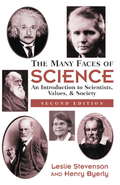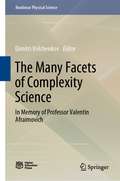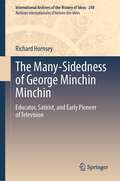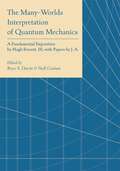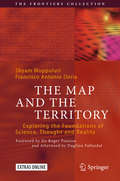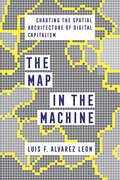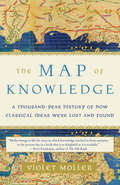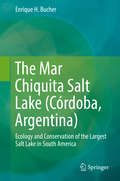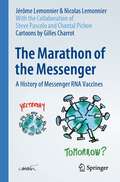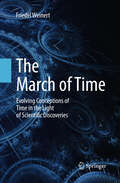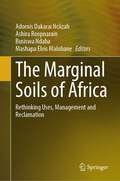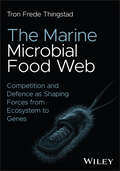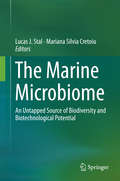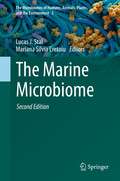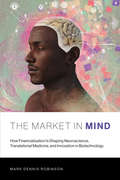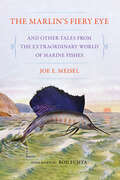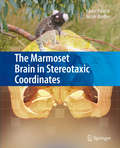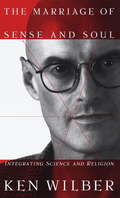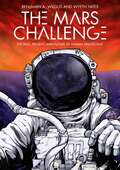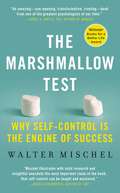- Table View
- List View
The Many Faces Of Science
by Henry Byerly Leslie StevensonThe development of modern science, and its increasing impact on our lives and cultures, is one of the great stories of our time. So, understanding--and coming to terms with--the institution of modern science should be an integral part of education. In The Many Faces of Science, Leslie Stevenson and Henry Byerly masterfully, and painlessly, provide the basic information and the philosophical reflection students need to gain such understanding. The authors make good use of case study methods, and they introduce us to dozens of figures from the history of science. Stevenson and Byerly provide an elementary sketch of the development of science through the lives of its practitioners, and they examine the often mixed motives of scientists, as well as the conflicting values people bring to science--and to their perceptions of its impact on society. The authors also explore the relationship between scientific practice and political and economic power. Accessible and rich with anecdotes, personal asides, and keen insight, The Many Faces of Science is the ideal interdisciplinary introduction for nonscientists in courses on science studies, science and society, and science and human values. It will also prove useful as supplementary reading in courses on science and philosophy, sociology, and political science. In this second edition of The Many Faces of Science, the authors have updated topics that they explore in the first edition, and they present new case studies on subjects such as HIV and AIDS, women in science, and work done in psychology and the social sciences. The authors also extend their discussion of science and values, in addition to revising their study of science and technology to emphasize changes in scientific practice today.
The Many Faces of George Washington: Remaking a Presidential Icon
by Carla Killough McClafferty"No picture accurately resembled him in the minute traits of his person . . . there was an expression of his face that no painter had succeeded in taking."—London's New Monthly Magazine in 1790 George Washington's face has been painted, printed, and engraved more than a billion times since his birth in 1732. And yet even in his lifetime, no picture seemed to capture the likeness of the man who is now the most iconic of all our presidents. Worse still, people today often see this founding father as the "old and grumpy" Washington on the dollar bill. In 2005 a team of historians, scientists, and artisans at Mount Vernon set out to change the image of our first president. They studied paintings and sculptures, pored over Washington's letters to his tailors and noted other people’s comments about his appearance, even closely examined the many sets of dentures that had been created for Washington. Researchers tapped into skills as diverse as 18th-century leatherworking and cutting-edge computer programming to assemble truer likenesses. Their painstaking research and exacting processes helped create three full-body representations of Washington as he was at key moments in his life. And all along the way, the team gained new insight into a man who was anything but "old and grumpy." Join award-winning author Carla Killough McClafferty as she unveils the statues of the three Georges and rediscovers the man who became the face of a new nation.
The Many Faces of Maxwell, Dirac and Einstein Equations
by Jr Waldyr A. Rodrigues Edmundo Capelas de OliveiraThis book is an exposition of the algebra and calculus of differentialforms, of the Clifford and Spin-Clifford bundle formalisms, and of vistas to aformulation of important concepts of differential geometry indispensable for anin-depth understanding of space-time physics. The formalism discloses the hidden geometrical nature of spinor fields. Maxwell, Dirac and Einstein fields are shown to have representatives by objectsof the same mathematical nature, namely sections of an appropriate Cliffordbundle. This approach reveals unity in diversity and suggests relationshipsthat are hidden in the standard formalisms and opens new paths for research. This thoroughly revised second edition also adds three new chapters: on the Cliffordbundle approach to the Riemannian or semi-Riemannian differential geometry ofbranes; on Komar currents in the context of the General Relativity theory; andan analysis of the similarities and main differences between Dirac, Majoranaand ELKO spinor fields. The exercises with solutions, thecomprehensive list of mathematical symbols, and the list of acronyms andabbreviations are provided for self-study for students as well as for classes. From the reviews of the firstedition: "The text is written in a veryreadable manner and is complemented with plenty of worked-out exercises whichare in the style of extended examples. . . . their book could also serve as atextbook for graduate students in physics or mathematics. " (AlbertoMolgado, Mathematical Reviews, 2008 k)
The Many Facets of Complexity Science: In Memory of Professor Valentin Afraimovich (Nonlinear Physical Science)
by Dimitri VolchenkovThis book explores recent developments in theoretical research and data analysis of real-world complex systems, organized in three parts, namely Entropy, information, and complexity functions Multistability, oscillations, and rhythmic synchronization Diffusions, rotation, and convection in fluids The collection of works devoted to the memory of Professor Valentin Afraimovich provides a deep insight into the recent developments in complexity science by introducing new concepts, methods, and applications in nonlinear dynamical systems covering physical problems and mathematical modelling relevant to economics, genetics, engineering vibrations, as well as classic problems in physics, fluid and climate dynamics, and urban dynamics. The book facilitates a better understanding of the mechanisms and phenomena in nonlinear dynamics and develops the corresponding mathematical theory to apply nonlinear design to practical engineering. It can be read by mathematicians, physicists, complex systems scientists, IT specialists, civil engineers, data scientists, and urban planners.
The Many-Sidedness of George Minchin Minchin: Educator, Satirist, and Early Pioneer of Television (International Archives of the History of Ideas Archives internationales d'histoire des idées #248)
by Richard HornseyThis book is the first complete biography of George Minchin Minchin (1845–1914), professor of applied mathematics at the Royal Indian Engineering College. Minchin’s extraordinary range of accomplishments offers a unique inside view of the major technological and educational developments of late nineteenth century Britain. The scientific community’s excitement during the early days of electromagnetic theory, wireless telegraphy, and x-rays are revealed by Minchin’s letters to eminent friends (notably the Maxwellians, Oliver Lodge and George Francis Fitzgerald). This book also traces Minchin’s little-known pioneering work on photoelectricity, which led to the first electrical measurements of starlight and laid the foundations for solar cells and television. Minchin’s mathematical textbooks were praised for their lucidity, and his advanced pedagogical thinking underpinned his lifelong work on reforming science education. He explained scientific concepts for a general audience using science fiction poetry and critiqued contemporary society in sharp and humorous satires. These works provide fresh perspectives on the place of science in Victorian society. This book is for anyone fascinated by the late nineteenth century revolution in electrical technologies.This is also a valuable read for historians of science, and for those interested in technical education, and science and society in Victorian Britain.
The Many-Worlds Interpretation of Quantum Mechanics: A Fundamental Exposition by Hugh Everett, III, with Papers by J. A. Wheeler, B. S. DeWitt, L. N. Cooper and D. Van Vechten, and N. Graham (Princeton Series in Physics)
by Neill Graham Bryce S. DeWittA landmark book on the influential many-worlds interpretation of quantum mechanicsIn 1957, Hugh Everett proposed a novel interpretation of quantum mechanics—a view that eventually became known as the many-worlds interpretation. This book presents Everett&’s two landmark papers on the idea—&“&‘Relative State&’ Formulation of Quantum Mechanics&” and &“The Theory of the Universal Wave Function&”—as well as further discussion of the idea in papers from a number of other physicists: J. A. Wheeler, Bryce DeWitt, L. N. Cooper and D. Van Vechten, and Neill Graham.In his interpretation, Everett denies the existence of a separate classical realm and asserts the propriety of considering a state vector for the whole universe. Because this state vector never collapses, reality as a whole is rigorously deterministic. This reality, which is described jointly by the dynamical variables and the state vector, isn&’t the reality customarily perceived; rather, it&’s a reality composed of many worlds. By virtue of the temporal development of the dynamical variables, the state vector decomposes naturally into orthogonal vectors, reflecting a continual splitting of the universe into a multitude of mutually unobservable but equally real worlds, in each of which every good measurement has yielded a definite result, and in most of which the familiar statistical quantum laws hold.Bryce S. DeWitt (1923–2004) was a prize-winning theoretical physicist and professor emeritus of physics at the University of Texas at Austin. Neill Graham (1941–2015) was a physicist and writer.
The Map and the Territory
by Shyam Wuppuluri Francisco Antonio DoriaThis volume presents essays by pioneering thinkers including Tyler Burge, Gregory Chaitin, Daniel Dennett, Barry Mazur, Nicholas Humphrey, John Searle and Ian Stewart. Together they illuminate the Map/Territory Distinction that underlies at the foundation of the scientific method, thought and the very reality itself. It is imperative to distinguish Map from the Territory while analyzing any subject but we often mistake map for the territory. Meaning for the Reference. Computational tool for what it computes. Representations are handy and tempting that we often end up committing the category error of over-marrying the representation with what is represented, so much so that the distinction between the former and the latter is lost. This error that has its roots in the pedagogy often generates a plethora of paradoxes/confusions which hinder the proper understanding of the subject. What are wave functions? Fields? Forces? Numbers? Sets? Classes? Operators? Functions? Alphabets and Sentences? Are they a part of our map (theory/representation)? Or do they actually belong to the territory (Reality)? Researcher, like a cartographer, clothes (or creates?) the reality by stitching multitudes of maps that simultaneously co-exist. A simple apple, for example, can be analyzed from several viewpoints beginning with evolution and biology, all the way down its microscopic quantum mechanical components. Is there a reality (or a real apple) out there apart from these maps? How do these various maps interact/intermingle with each other to produce a coherent reality that we interact with? Or do they not?Does our brain uses its own internal maps to facilitate “physicist/mathematician” in us to construct the maps about the external territories in turn? If so, what is the nature of these internal maps? Are there meta-maps? Evolution definitely fences our perception and thereby our ability to construct maps, revealing to us only those aspects beneficial for our survival. But the question is, to what extent? Is there a way out of the metaphorical Platonic cave erected around us by the nature? While “Map is not the territory” as Alfred Korzybski remarked, join us in this journey to know more, while we inquire on the nature and the reality of the maps which try to map the reality out there. The book also includes a foreword by Sir Roger Penrose and an afterword by Dagfinn Follesdal.
The Map in the Machine: Charting the Spatial Architecture of Digital Capitalism
by Luis F. Alvarez LeonDigital technologies have changed how we shop, work, play, and communicate, reshaping our societies and economies. To understand digital capitalism, we need to grasp how advances in geospatial technologies underpin the construction, operation, and refinement of markets for digital goods and services. In The Map in the Machine, Luis F. Alvarez Leon examines these advances, from MapQuest and Google Maps to the rise of IP geolocation, ridesharing, and a new Earth Observation satellite ecosystem. He develops a geographical theory of digital capitalism centered on the processes of location, valuation, and marketization to provide a new vantage point from which to better understand, and intervene in, the dominant techno-economic paradigm of our time. By centering the spatiality of digital capitalism, Alvarez Leon shows how this system is the product not of seemingly intangible information clouds but rather of a vast array of technologies, practices, and infrastructures deeply rooted in place, mediated by geography, and open to contestation and change.
The Map of Knowledge: A Thousand-Year History of How Classical Ideas Were Lost and Found
by Violet Moller&“The Map of Knowledge is an endlessly fascinating book, rich in detail, capacious and humane in vision.&”—Stephen Greenblatt, author of The Swerve: How the World Became Modern, winner of the Pulitzer PrizeAfter the Fall of Rome, when many of the great ideas of the ancient world were lost to the ravages of the Dark Ages, three crucial manuscripts passed hand to hand through seven Mediterranean cities and survived to fuel the revival of the Renaissance--an exciting debut history. The foundations of modern knowledge—philosophy, math, astronomy, geography—were laid by the Greeks, whose ideas were written on scrolls and stored in libraries across the Mediterranean and beyond. But as the vast Roman Empire disintegrated, so did appreciation of these precious texts. Christianity cast a shadow over so-called pagan thought, books were burned, and the library of Alexandria, the greatest repository of classical knowledge, was destroyed. Yet some texts did survive and The Map of Knowledge explores the role played by seven cities around the Mediterranean—rare centers of knowledge in a dark world, where scholars supported by enlightened heads of state collected, translated and shared manuscripts. In 8th century Baghdad, Arab discoveries augmented Greek learning. Exchange within the thriving Muslim world brought that knowledge to Cordoba, Spain. Toledo became a famous center of translation from Arabic into Latin, a portal through which Greek and Arab ideas reached Western Europe. Salerno, on the Italian coast, was the great center of medical studies, and Sicily, ancient colony of the Greeks, was one of the few places in the West to retain contact with Greek culture and language. Scholars in these cities helped classical ideas make their way to Venice in the 15th century, where printers thrived and the Renaissance took root. The Map of Knowledge follows three key texts—Euclid's Elements, Ptolemy's The Almagest, and Galen's writings on medicine—on a perilous journey driven by insatiable curiosity about the world.
The Mapmaker's Wife: A True Tale Of Love, Murder, And Survival In The Amazon
by Robert WhitakerIn 1735 a team of French scientists set out on a daring expedition into the South American wilderness to resolve one of the great scientific challenges of the time: the precise size and shape of the Earth. Scaling the Andes and journeying along the Amazon, the mapmakers faced all manner of danger, while madness, disease and violent death each took their toll. However one, Jean Godin, fell in love with a local girl called Isabel Grameson. When the time came for the expedition to return to France, Godin travelled ahead to ensure the way was safe for his new family. But on reaching French Guiana, disaster struck: Spain and Portugal closed their borders and he was stranded, unable to return to Isabel. What followed lies at the core of this extraordinary tale - a heartbreaking 20-year separation that ended when Isabel, believing she might never see her husband again, decided to make her own way across the continent: a journey that began in hope but became hell on earth. . . Drawing on his own experience retracing Isabel's epic trek as well as contemporary records, Robert Whitaker recounts a captivating true story of love and survival set against the backdrop of what many still regard as 'the greatest expedition the world has ever known'.
The Mapmakers
by Tamzin MerchantReturn to Cordelia Hatmaker’s spellbinding world of magic and millinery in this sparkling sequel to The Hatmakers. Cordelia Hatmaker has saved England from war. She stopped Lord Whitloof’s sinister plans, rescued the King and Princess, and restored the Makers Guild. But she still hasn’t found her missing father. Ever since Cordelia discovered the hidden map in her father’s telescope, she’s been searching the streets of London by starlight, trying to uncover its secrets. She never expects to stumble upon a secret society of Mapmakers—or to learn that magic isn’t limited to the few Maker families, but instead is all around, if you know where to look. But danger is lurking around every corner, and Cordelia must convince the rival Maker families to work together for once—not only to bring her father home, but to save the very essence of magic itself. . . . With exceptional and inventive storytelling and a lionhearted heroine, Tamzin Merchant once again draws readers into her captivating London and takes them on a breathless new adventure full of wildness, wit, warmth—and magic.
The Mar Chiquita Salt Lake (Córdoba, Argentina): Ecology and Conservation of the Largest Salt Lake in South America
by Enrique H. BucherThis book provides a comprehensive, updated syntheses of all the information available on Mar Chiquita, covering various aspects of the geography, geological history, biology and ecology of the site, as well as a detailed analysis of the current land-use patterns, environmental threats, and conservation issues. Mar Chiquita, located in the province of Cordoba, Argentina, is a protected wilderness area that includes South America’s largest saline lake and wetland. It has a very rich bird biodiversity, including three of the six species of flamingos that exist in the world, and high numbers of intercontinental migratory shorebirds. For this reason, the area has been declared an International Site by the Ramsar Convention on Wetlands of International Importance, and also a Site of Hemispheric Importance by the Western Hemisphere Shorebird Reserves Network. Largely unknown until very recently, particularly in terms of the English literature, the site is rapidly gaining international visibility, not only in terms of scientific research, but also as site of interest for the nature lovers around the globe. Written in a language accessible to the non-specialists, the book focuses on integrating the dynamic, functional processes in the ecosystem, while at the same time providing the necessary descriptive information. Accordingly, it is of interest to scientists from diverse disciplines interested in saline wetlands, as well as to students, managers, and the general public.
The Marathon of the Messenger: A History of Messenger RNA Vaccines
by Jérôme Lemonnier Nicolas LemonnierThe Covid-19 pandemic changed the world. Indeed a real race took place worldwide between SARS-CoV-2 on the one hand and researchers on the other – especially those specializing in messenger RNA vaccines. Four years after its emergence, the pandemic is not over, but some decisive battles have been won, thanks to the great success of mRNA vaccines. The Marathon of The Messenger presents the history of these mRNA vaccines, combining a scientific background with historical and economic perspectives. It appears that an important page in the history of these new vaccines was written in Europe, thanks to the crucial work of German and French scientists; this effort began in 1993 and continues to this day. In the face of a prevailing single-mindedness, these researchers pushed through a new therapeutic concept and defined the biotechnological keys that would open the way to the production of therapeutic messenger RNA in the fight against cancer and viral infections. Written for a broad audience and accompanied by humorous cartoons, this book will appeal to anyone looking for scientific and historical answers about mRNA vaccines. Readers will discover not only the technical and scientific knowledge of how these vaccines work, but also the economic levers that were necessary to create this technology. This book has been written in collaboration with Dr. Steve Pascolo, former director of CureVac, and the RNA messenger expert Professor Chantal Pichon. It also features a preface by Dr. Pierre Meulien, former director of the European Union public-private partnership Innovative Medicines Initiative (IMI).
The March of Time
by Friedel WeinertThe aim of this interdisciplinary study is to reconstruct the evolution of our changing conceptions of time in the light of scientific discoveries. It will adopt a new perspective and organize the material around three central themes, which run through our history of time reckoning: cosmology and regularity; stasis and flux; symmetry and asymmetry. It is the physical criteria that humans choose - relativistic effects and time-symmetric equations or dynamic-kinematic effects and asymmetric conditions - that establish our views on the nature of time. This book will defend a dynamic rather than a static view of time.
The Marginal Soils of Africa: Rethinking Uses, Management and Reclamation
by Adornis Dakarai Nciizah Ashira Roopnarain Busiswa Ndaba Mashapa Elvis MalobaneThis book addressed the pressing challenges of climate change, land scarcity, and food security, offering a comprehensive synthesis of research on using, managing, and reclaiming marginal lands in Africa. Unfavourable climatic conditions and rapid population growth intensify competition for land, putting pressure on traditional agricultural soils thus necessitating a transition towards underutilized marginal lands. Reclaiming these damaged and undervalued areas through various technologies presents a promising path not only to food independence but also to second-generation biofuel feedstock production, utilizing excess biomass from these revived lands. While recent years have seen increased focus on restoring degraded lands, a crucial gap remains i.e. a unified knowledge base detailing the efficacy of various reclamation technologies. This book fills that void, empowering farmers and policymakers with the insights they need to make informed decisions, mobilize resources effectively, and ultimately help Africa meet its projected 60% food demand increase.
The Marine Microbial Food Web: Competition and Defence as Shaping Forces from Ecosystem to Genes
by Tron Frede ThingstadAn authoritative and up-to-date exploration of how the competition-defence trade-off has shaped the marine microbial food web In The Marine Microbial Food Web: Competition and Defence as Shaping Forces from Ecosystem to Genes, distinguished researcher Tron Frede Thingstad delivers an insightful and practical discussion of the microbial portion of the ocean’s food web. The author describes how specific factors, including evolution, biodiversity, organism life strategies, genome organization, biogeochemistry, food web structure, and population dynamics, can be understood as the consequences of the balance between competition and defence. Using modular idealized mathematical models developed from classical Lotka-Volterra formulations, the book describes models that explain the balance between production and consumption of organic material in the photic zone and the potential for export to the ocean’s interior. It also explains how the models are relevant to contemporary climate change and a variety of other modern applications. Readers will also find: A thorough explanation of why the pathogenicity of many “L-strategists” probably originated as coincidental evolution from originally evolved mechanisms for predator defenceComprehensive explorations of the role of the marine microbial food web in ocean biogeochemistry and productionPractical discussions of simple mathematical models of competition, defence, trade-off, and fitnessFulsome treatments of a wide range of organization levels, including individual cells and larger communities of organisms Perfect for researchers, students, and instructors of marine ecology, marine microbiology, and microbial oceanography, The Marine Microbial Food Web will also prove invaluable to limnologists, oceanographers, and students with an interest in applied mathematics.
The Marine Microbiome
by Lucas J. Stal Mariana Silvia CretoiuThis book describes the state-of-the-artconcerning the 'marine microbiome' and its uses in biotechnology. The firstpart discusses the diversity and ecology of marine microorganisms and viruses,including all three domains of life: Bacteria, Archaea, and Eukarya. Itdiscusses whether marine microorganisms exist and, if so, why they might be unique. The second part presents selected marine habitats, their inhabitants and howthey influence biogeochemical cycles, while the third discusses the utilizationof marine microbial resources, including legal aspects, dissemination, andpublic awareness. The marine microbiome is the total ofmicroorganisms and viruses in the ocean and seas and in any connectedenvironment, including the seafloor and marine animals and plants. Thediversity of microbial life remains unquantified and largely unknown, and couldrepresent a hidden treasure for human society. Accordingly, this book is also intendedto connect academics and industry, providing essential information for microbiologistsfrom both fields.
The Marine Microbiome (The Microbiomes of Humans, Animals, Plants, and the Environment #3)
by Lucas J. Stal Mariana Silvia CretoiuThis updated and expanded second edition reviews numerous aspects of the marine microbiome and its possible industrial applications. The marine microbiome is the total of microorganisms and viruses in the ocean and seas and in any connected environment, including the seafloor and marine animals and plants. In the first part of the book, diversity, origin and evolution of the marine microorganisms and viruses are discussed. The microbes presented originate from all three domains of life: Bacteria, Archaea, and Eukarya. The second part sheds some light on the different communities: it describes marine habitats and how their inhabitants control biogeochemical cycles. The third part finally examines the microbial ocean as a global system and evaluates methods of utilizing marine microbial resources. Adopting a translational approach, the book connects academic research with industrial applications, making it a fascinating read and valuable resource for microbiologists from both domains.
The Market in Birds: Commercial Hunting, Conservation, and the Origins of Wildlife Consumerism, 1850–1920
by Andrea L. SmalleyA fascinating look at how a commercial market for birds in the late nineteenth century set the stage for conservation and its legislation.Between the end of the Civil War and the 1920s, the United States witnessed the creation, rapid expansion, and then disappearance of a commercial market for hunted wild animals. The bulk of commercial wildlife sales in the last part of the nineteenth century were of wildfowl, who were prized not only for their eggs and meat but also for their beautiful feathers. Wild birds were brought to cities in those years to be sold as food for customers' tables, decorations for ladies' hats, treasured pets, and specimens for collectors' cabinets. Though relatively short-lived, this market in birds was broadly influential, its rise and fall coinciding with the birth of the Progressive Era conservation movement. In The Market in Birds, historian Andrea L. Smalley and wildlife biologist Henry M. Reeves illuminate this crucial chapter in American environmental history. Touching on ecology, economics, law, and culture, the authors reveal how commercial hunting set the terms for wildlife conservation and the first federal wildlife legislation at the turn of the twentieth century. Smalley and Reeves delve into the ground-level interactions among market hunters, game dealers, consumers, sportsmen, conservationists, and the wild birds they all wanted. Ultimately, they argue, wildfowl commercialization represented a revolutionary shift in wildlife use, turning what had been a mostly limited, local, and seasonal trade into an interstate industrial-capitalist enterprise. In the process, it provoked a critical public debate over the value of wildlife in a modern consumer culture. By the turn of the twentieth century, the authors reveal, it was clear that wild bird populations were declining precipitously all over North America. The looming possibility of a future without birds sparked intense debate nationwide and eventually culminated in the 1918 Migratory Bird Treaty Act. Scholars, environmentalists, wildlife professionals, and anyone concerned about wildlife will find this new perspective on conservation history enlightening reading.
The Market in Mind: How Financialization Is Shaping Neuroscience, Translational Medicine, and Innovation in Biotechnology (The\mit Press Ser.)
by Mark Dennis RobinsonA critical examination of translational medicine, when private risk is transferred to the public sector and university research teams become tech startups for global investors.A global shift has secretly transformed science and medicine. Starting in 2003, biomedical research in the West has been reshaped by the emergence of translational science and medicine—the idea that the aim of research is to translate findings as quickly as possible into medical products. In The Market in Mind, Mark Dennis Robinson charts this shift, arguing that the new research paradigm has turned university research teams into small biotechnology startups and their industry partners into early-stage investment firms. There is also a larger, surprising consequence from this shift: according to Robinson, translational science and medicine enable biopharmaceutical firms, as part of a broader financial strategy, to outsource the riskiest parts of research to nonprofit universities. Robinson examines the implications of this new configuration. What happens, for example, when universities absorb unknown levels of risk? Robinson argues that in the years since the global financial crisis translational science and medicine has brought about “the financialization of health.”Robinson explores such topics as shareholder anxiety and industry retreat from Alzheimer's and depression research; how laboratory research is understood as health innovation even when there is no product; the emergence of investor networking events as crucial for viewing science in a market context; and the place of patients in research decisions. Although translational medicine justifies itself by the goal of relieving patients' suffering, Robinson finds patients' voices largely marginalized in translational neuroscience.
The Marlin's Fiery Eye and Other Tales from the Extraordinary World of Marine Fishes
by Joe E. MeiselThe Marlin's Fiery Eye and Other Tales from the Extraordinary World of Marine Fishes dives into the mystery and wonder of the daily lives of saltwater fishes. Joe E. Meisel introduces readers to the fascinating behaviors, remarkable adaptations, and complex life histories of the many species that call the oceans home.From the shallows, where penetrating sunlight encourages bright colors and extravagant patterns in fish, to the abyssal depths, where extreme conditions are countered in bizarre ways, this book illuminates the staggering diversity of ocean life. Discussions of unique characteristics and lifestyles are accompanied by narratives from scientists and fish lovers, with detailed illustrations throughout. Meisel also explores the challenges facing global fisheries today, connecting the book's featured species with questions and opportunities surrounding food demand, aquaculture, and sustainability.Each fish has a story to tell in The Marlin's Fiery Eye and Other Tales from the Extraordinary World of Marine Fishes, and through each story readers will discover an awe and a fascination for the oceanic inhabitants that we so rarely get to witness.
The Marmoset Brain in Stereotaxic Coordinates
by Xavier Palazzi Nicole BordierLaboratory-bred common marmosets (Callithrix jacchus) have a natural lifespan in captivity in excess of 12 years, while their maximum longevity is more than 16 years. Due to its small size, its relatively easy adaptation to laboratory conditions, and neuroanatomical similarities with human species, this animal is considered to represent a convenient primate model for neurosciences and drug development. The Marmoset Brain in Stereotaxic Coordinates provides a comprehensive guide for those - both researchers and undergraduates - who are interested in the marmoset brain, tissue target characterization and comparative anatomy. The nomenclature and atlas presentation were inspired from existing reference brain atlases in other species, and the high quality of illustrations was achieved thanks to automated whole slide scanning.
The Marriage of Sense and Soul: Integrating Science and Religion
by Ken WilberThere is arguably no more critical and pressing topic than the relation of science and religion in the modern world. Science has given us the methods for discovering truth, while religion remains the single greatest force for generating meaning. Yet the two are seen as mutually exclusive, with wrenching consequences for humanity. In The Marriage of Sense and Soul, one of today's most important philosophers brilliantly articulates how we might begin to think about science and religion in ways that allow for their reconciliation and union, on terms that will be acceptable to both camps. Ken Wilber is widely acclaimed as the foremost thinker in integrating Western psychology and the Eastern spiritual traditions. His many books have reached across disciplines and synthesized the teachings of religion, psychology, physics, mysticism, sociology, and anthropology, earning him a devoted international following. The Marriage of Sense and Soul is his most accessible work yet, aimed at guiding a general audience to the mutual accord between the spiritual, subjective world of ancient wisdom and the objective, empirical world of modern knowledge. Wilber clearly and succinctly explores the schism between science and religion, and the impact of this "philosophical Cold War" on the fate of humanity. He systematically reviews previous attempts at integration, explaining why romantic, idealistic, and postmodern theories failed. And he demonstrates how science is compatible with certain deep features common to all of the world's major religious traditions. In pointing the way to a union between truth and meaning, Ken Wilber has created an elegant and accessible book that is breathtaking in its scope.From the Hardcover edition.
The Mars Challenge: The Past, Present, and Future of Human Spaceflight
by Benjamin A. WilgusTravel to deep space and back again with The Mars Challenge, a nonfiction graphic novel for teens about the science and logistics of a manned mission to Mars.Nadia is a teen with a dream: to be the first woman on Mars. But to get there, she's got to learn all she can about the science of spaceflight. It's a good thing her friend Eleanor is an Attitude Determination and Control Officer—basically, she pilots the International Space Station!Eleanor takes Nadia on a conceptual journey through an entire crewed mission to Mars, and explains every challenge that must be overcome along the way; from escaping Earth's gravity well, to keeping the crew healthy as they travel through deep space, to setting up a Mars base, to having enough fuel for the trip home! In The Mars Challenge, writer Benjamin A. Wilgus and artist Wyeth Yates bring the reader on a thrilling interplanetary voyage and clearly illustrate the scientific concepts and complex machinery involved. Humans can reach Mars in our lifetime—this book explains how it can be done.
The Marshmallow Test: Mastering Self-Control
by Walter MischelRenowned psychologist Walter Mischel, designer of the famous Marshmallow Test, explains what self-control is and how to master it. A child is presented with a marshmallow and given a choice: Eat this one now, or wait and enjoy two later. What will she do? And what are the implications for her behavior later in life?The world's leading expert on self-control, Walter Mischel has proven that the ability to delay gratification is critical for a successful life, predicting higher SAT scores, better social and cognitive functioning, a healthier lifestyle and a greater sense of self-worth. But is willpower prewired, or can it be taught? In The Marshmallow Test, Mischel explains how self-control can be mastered and applied to challenges in everyday life--from weight control to quitting smoking, overcoming heartbreak, making major decisions, and planning for retirement. With profound implications for the choices we make in parenting, education, public policy and self-care, The Marshmallow Test will change the way you think about who we are and what we can be.
